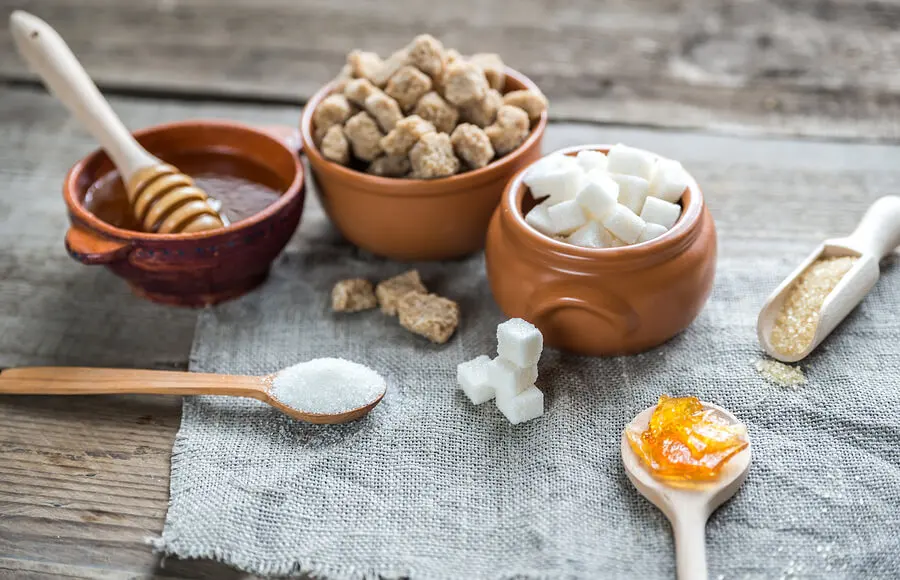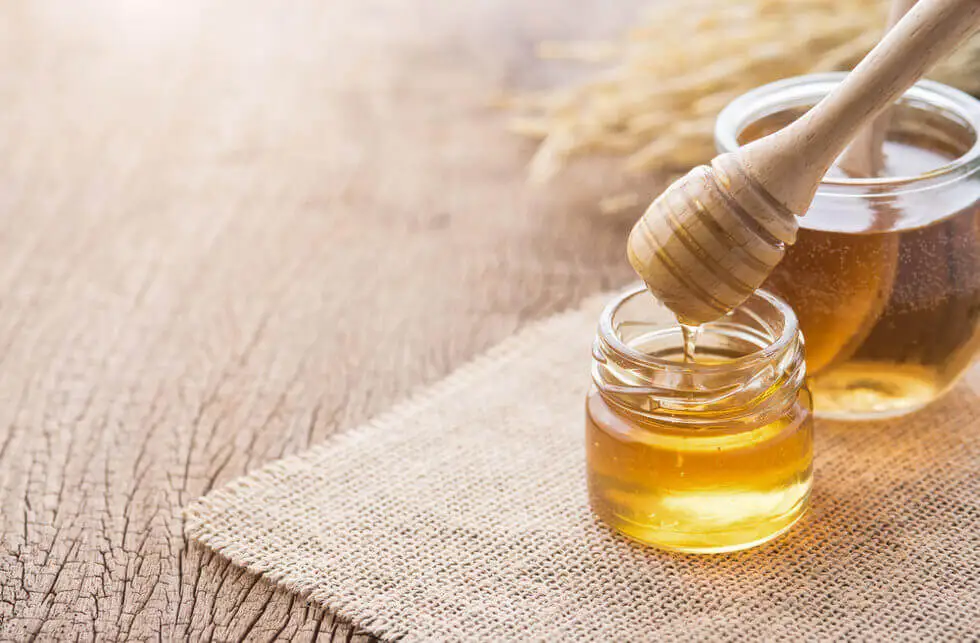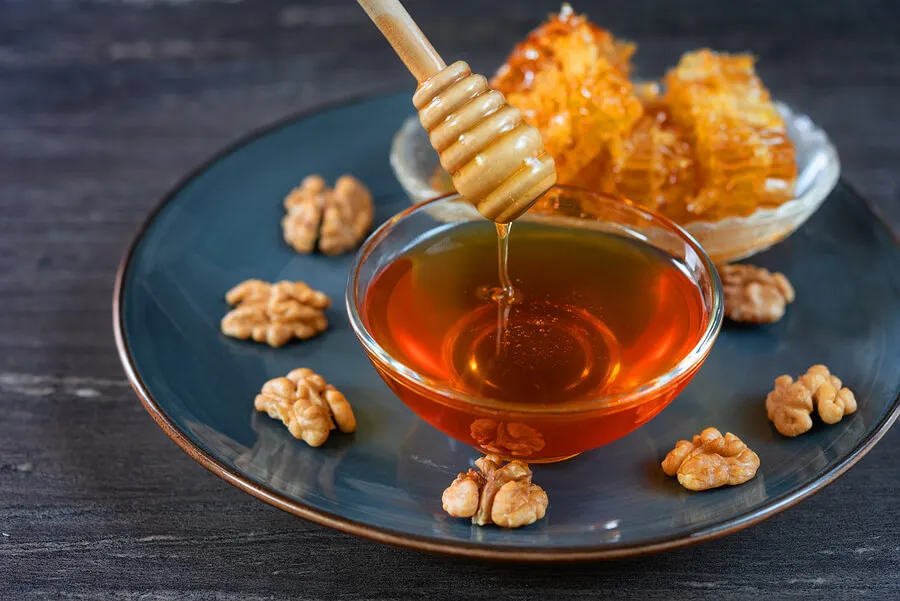Honey or Sugar: Do You Know Which is Better?


Reviewed and approved by the doctor Nelton Abdon Ramos Rojas
There are many options to sweeten an infusion or a dessert and, surely, you may wonder which is the healthiest (or the least harmful): honey or sugar?
Perhaps you consume natural herbal teas, you want to lose weight, or you’re are of the number of chemicals that white sugar often has. Therefore, in this article, we’ll tell you about the contest between honey and sugar: which sweetener will win?
Natural honey vs. man-made honey
Before talking about the differences between honey and sugar, it’s first important to clarify that there are two different types of honey: natural honey and made-made honey. Natural honey is a product that has not undergone any kind of processing, so it’s in its natural state. It’s also known as raw honey.
Man-made honey, on the other hand, has to undergo various thermal processes to increase its durability. The idea is to ensure that it can be on a shelf for a certain time without affecting its quality.
Generally speaking, and following the advice of experts, all types of honey have a high sugar content and a low water and acidity content. The main difference between both types of honey is that thermal processes can alter its composition, eliminating some minerals, enzymes, and antioxidants. In this sense, it’s always be advisable to opt for the most natural product.
Is honey healthier than sugar?
Although nutritionists indicate that it’s always better to drink tea without any sweetener, it’s more than usual to want to add something that provides a sweet taste. This is when we want to know which option is the most suitable: honey or sugar.
If we refer to honey (as long as it is organic) we must say that it sweetens more than refined sugars. It also provides antioxidants, vitamins, and minerals. All this set of nutrients can help prevent colds, sore throats, and flu, according to a study conducted on rats in 2016.
A small amount of honey sweetens much more than a spoonful of sugar. Therefore, we will need less to get the same (or greater) results in desserts or infusions.
We should also not leave aside either that refined sugar provides empty calories. This means that it has no nutrients, no vitamins, or minerals.
Honey, being produced from the nectar of flowers, gives us a good amount of water and some nutritional properties.
We think you may also enjoy reading this article: Does Mixing Alcohol and Sugar Cause a Hangover? This is what Science Says
Honey or sugar: The differences and similarities

A major difference between both sweeteners is the type of sugar that each of them provides us with.
To begin with, refined or white sugar contains almost pure sucrose. Honey, on the other hand, contains fructose and glucose, although the former predominates over the latter. Despite this, you should know that fructose has a lower glycemic index than glucose and sucrose.
As for the taste, those who have tried the two will be able to corroborate their differences. Sugar is sweeter because of the sucrose it contains, but honey allows us to enjoy different tastes depending on the flowers with which it has been produced.
In favor of sugar in gastronomy, we can point out that it has the ability to caramelize and be used as decoration in cakes. In addition, its consistency makes it ideal for certain preparations and dishes. However, be aware that honey is not far behind: it can be used to compact cereal bars and add aromas to recipes.
To learn more about the differences and similarities between honey and sugar, we’ll leave you with a brief compilation of its properties according to experts: per 100 grams:
- Glycemic index: honey (58), sugar (60)
- Water: honey (17 grams), sugar (0.03 grams)
- Sugars: honey (80 grams), sugar (99.99 grams)
- Calories: honey (300), sugar (387)
- Calcium: honey (6 milligrams), sugar (1 milligram)
- Magnesium: honey (2 milligrams), sugar (0 milligrams)
- Phosphorus: honey (4 milligrams), sugar (0 milligrams)
- Potassium: honey (52 milligrams), sugar (2 milligrams)
Honey and diabetes

We have already established that honey has fewer calories, a lower glycemic index and a lower concentration of sugars than refined sugar. Does this imply that it is better for people with diabetes? In principle, yes; although as long as it is consumed in moderation and under the supervision of the specialist.
A work published in the International Journal of Preventive Medicine in 2019 evaluated the effect of natural honey on glycemic control and anthropometric measurements of patients with type 2 diabetes. They found that honey reduced waist circumference in patients who used it, in addition to slightly reducing insulin concentration and secretion.
It has been suggested to reduce plasma glucose, C-reactive protein, homocysteine and blood lipids in healthy, diabetic and hyperlipidemic subjects; and animal experiments show that it can protect against metabolic side effects in diabetic patients.
It has even been used in the company of antidiabetic medications to improve blood glucose control. Based on this, we can say that honey is slightly better than refined sugar when we talk about diabetes; but this statement must be taken with caution.
In this way, people diagnosed with diabetes should use honey as if they were treating refined sugar. That is, limiting its consumption on a day-to-day basis. Before using it, you should consult with a specialist to endorse its intake according to each case.
Like this article? You may also like to read: Turbinado Sugar: Nutritional Information, Benefits, and Uses
So, honey or sugar?

Actually, it all depends on our individual preferences. While we can opt for honey for a matter of naturalness, we also have the possibility of choosing the second one, since we will need less quantity to sweeten a tea, a coffee, or a flan.
There are many options to give a sweet taste to food and drinks. It’s not necessary to be so categorical and lean towards a single alternative.
The truth is that many foods we buy contain “empty” sugars or sweeteners. Therefore, a good idea could be to use honey in what we choose to sweeten (for example, an infusion or a homemade cake). The good news is that there are many options other than honey or sugar to sweeten recipes:
- Stevia
- Dates
- Coconut sugar
- Agave syrup
Likewise, let’s not forget mascabo or mascabado sugar (which contains honey) and molasses from grains such as rice, corn, or barley.
As you can see, the benefits of honey or sugar to sweeten meals aren’t as different as you may think. Both products provide a very similar amount of calories and have the same effects on glycemic control. In this sense, you will have to consider the particular benefits of each one and select the one that you believe is best for you.
All cited sources were thoroughly reviewed by our team to ensure their quality, reliability, currency, and validity. The bibliography of this article was considered reliable and of academic or scientific accuracy.
- Al-Waili NS. Natural honey lowers plasma glucose, C-reactive protein, homocysteine, and blood lipids in healthy, diabetic, and hyperlipidemic subjects: comparison with dextrose and sucrose. J Med Food. 2004 Spring;7(1):100-7.
- Bobiş O, Dezmirean DS, Moise AR. Honey and Diabetes: The Importance of Natural Simple Sugars in Diet for Preventing and Treating Different Type of Diabetes. Oxid Med Cell Longev. 2018 Feb 4;2018:4757893.
- Busserolles J, Gueux E, Rock E, Mazur A, Rayssiguier Y. Substituting honey for refined carbohydrates protects rats from hypertriglyceridemic and prooxidative effects of fructose. J Nutr. 2002 Nov;132(11):3379-82.
- Erejuwa OO, Sulaiman SA, Wahab MS, Sirajudeen KN, Salleh MS, Gurtu S. Glibenclamide or metformin combined with honey improves glycemic control in streptozotocin-induced diabetic rats. Int J Biol Sci. 2011 Mar 14;7(2):244-52.
- Mohapatra DP, Thakur V, Brar SK. Antibacterial efficacy of raw and processed honey. Biotechnol Res Int. 2011;2011:917505.
- Sadeghi F, Salehi S, Kohanmoo A, Akhlaghi M. Effect of Natural Honey on Glycemic Control and Anthropometric Measures of Patients with Type 2 Diabetes: A Randomized Controlled Crossover Trial. Int J Prev Med. 2019 Jan 15;10:3.
This text is provided for informational purposes only and does not replace consultation with a professional. If in doubt, consult your specialist.








